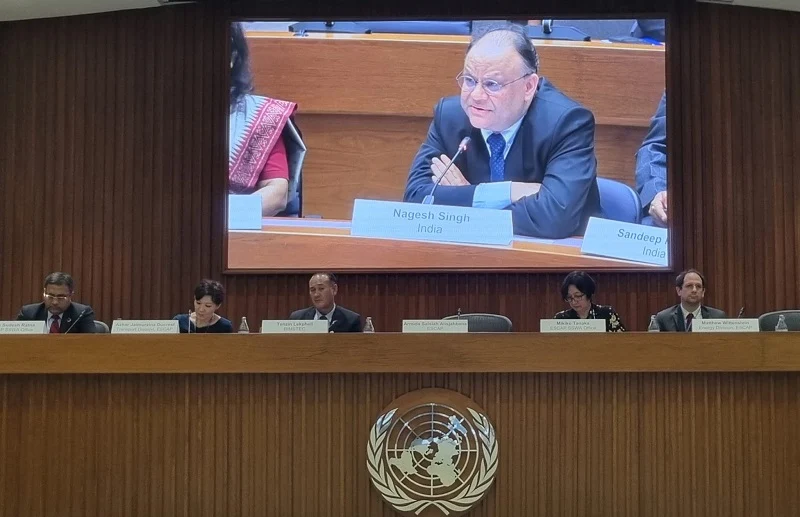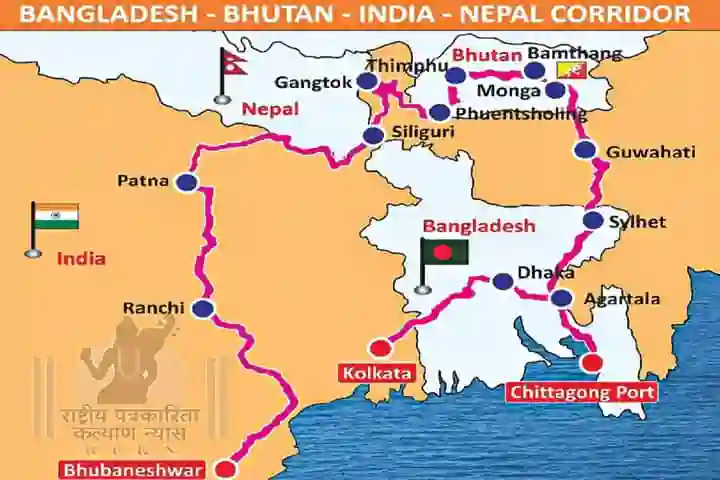

India's Ambassador to Thailand Nagesh Singh at the ESCAP event in Bangkok on Wednesday (Image courtesy: Embassy of India in Thailand)
Representatives of Bangladesh, Bhutan, India and Nepal – commonly referred to as ‘BBIN’ countries – deliberated on optimising cross-border connectivity during a side event of the ongoing 79th session of the United Nations Economic and Social Commission for Asia and the Pacific (ESCAP) in Bangkok on Wednesday.
Spotlighting the strategic geo-political and economic importance of land link between Key South Asian countries, India’s Ambassador to Thailand Nagesh Singh presented New Delhi’s views on the potential benefits of sub-regional connectivity.
Titled ‘Enhancing cross border connectivity towards SDGs and shared prosperity in BBIN – Bangladesh, Bhutan, India, Nepal’, the discussion aimed at identifying priority “early harvest” opportunities that BBIN countries can work together to capitalise on past and ongoing investments besides recommending the way forward of collaborative actions.
Nepal’s Ambassador to Thailand Ganesh Prasad Dhakal, who like Singh is his country’s Permanent Representative to the UNESCAP, also made an intervention along with his counterparts from Bangladesh and Bhutan as the participants delved into the great potential of connectivity and cooperation within South Asia and with Southeast Asia.


Possible areas of ESCAP support in collaboration with the Bay of Bengal Initiative for Multi-sectoral Technical and Economic Cooperation (BIMSTEC) and other partners were discussed in the presence of top officials, including the BIMSTEC Secretary General Tenzin Lekphell.
The BBIN countries are members of BIMSTEC along with Sri Lanka, Myanmar, and Thailand.
An ESCAP presentation to share findings of a recent study on BBIN connectivity opportunities and relevant regional experiences mentioned that cross-border connectivity amongst these countries is also important for accelerating the Sustainable Development Goals (SDGs) for people living in this sub-region.
“Optimising international transit routes via road, rail and waterways would help reduce costs of trade, contribute to sustainable transport and trade, diversify trade and economic opportunities, and connect BBIN countries to regional and global value chains,” stated ESCAP.
BBIN, it added, becomes more significant for Bhutan, Bangladesh and Nepal as they are in a critical developmental phase and preparing for graduation from Least Developed Country status in 2023 (Bhutan) and 2026 (Bangladesh and Nepal).
It was also suggested that a multilateral agreement on cross-border energy trade can bring greater inclusiveness and energy security, and significantly contribute to climate action as it will allow the flow of green energy from the north (Nepal and Bhutan) towards the south (India and Bangladesh).
India decisively asserted its military superiority over Pakistan during this month's brief but intense conflict,…
Trade associations and local business groups in Pakistan-occupied Gilgit-Baltistan (PoGB) launched an indefinite protest on…
A human chain and protest march was organized by various organizations in front of the…
The United States on Saturday announced the expansion of its security partnerships with India through…
Highlighting the use of indigenous platforms during Operation Sindoor, Chief of Defence Staff (CDS) General…
Congress MP Shashi Tharoor on Friday (local time) said that Colombia will issue a statement…